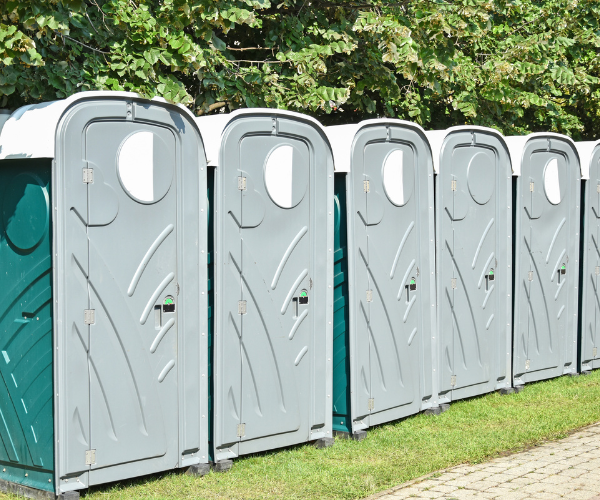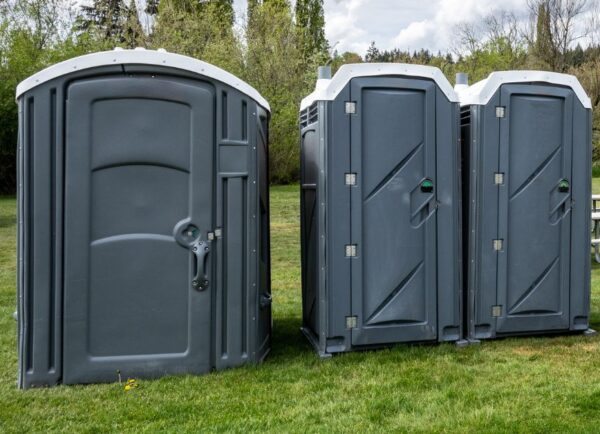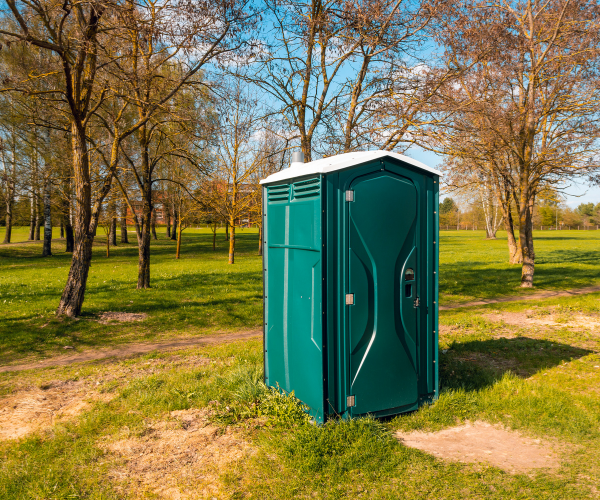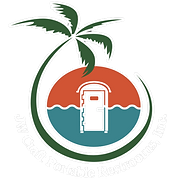Portable toilets represent an eco-friendly choice in sanitation, significantly reducing waste of resources involved in conventional restroom facilities. One primary benefit is the conservation of water. Portable units use a fraction of the water needed per flush compared to standard toilets, minimizing freshwater use remarkably. This is critical in efforts to conserve water resources globally, especially in areas facing scarcity.Moreover, portable toilets help manage waste more effectively by safely containing it until disposal, minimizing environmental impact. Waste-handling processes in portable toilets are designed to prevent contamination of soil and groundwater, aligning the practice with sustainable waste management.Made from recyclable materials, many portable toilets contribute to sustainability beyond their primary use. Today's manufacturers consider environmental impacts, and some designs incorporate materials that are biodegradable, further lessening ecological footprints.Companies like JW Craft use eco-conscious sanitizing fluids without harming natural ecosystems post-breakdown. Through partnerships with eco-friendly waste-processing facilities, the cycle is thoroughly green. In events or worksites, portable toilets cut the costs and emissions associated with building and maintaining flushable facilities. By selecting them over building permanent restrooms, a significant decrease in the consumption of resources and waste creation at the event site is achieved.Beyond logistical advantages, relying on portable toilets reduces energy consumption by avoiding continuous water pumping and sewage treatment systems. It results in a lower carbon footprint while supporting essential functions in public sanitation. Opting for portable toilets ensures the environment is respected through thoughtfully implemented sanitation solutions, providing a superb balance of convenience and responsibility.

Portable Toilet Rentals in Highlands County, Florida
Call today for a free quote (239) 402-7239
Portable Toilet
Fast, Easy, & 100% Free To Get Started
Over 20 Years of Experience
JW Craft, with over 20 years of experience, has cultivated strong community ties in Highlands County. We prioritize quality in every transaction, ensuring customer satisfaction consistently.
Unmatched Quality Service
At JW Craft, we deliver top-quality service by maintaining each portable toilet to the highest cleanliness standards. Our dedication to excellence is evident in every aspect of our work.
Fast and Reliable Delivery
Select JW Craft for swift delivery of portable toilets to your event or worksite. Our effective service ensures timely and seamless setup.
Convenient Portable Toilet Services in Highlands County
Call for a Free Quote Today
(239) 402-7239
JW Craft stands as the leading provider of portable toilets in Highlands County and surrounding regions. As a locally-owned business, we pride ourselves on our dependable reputation for delivering reliable service. Our commitment to excellence is evident in the solutions we provide for various events, including construction sites, parties, festivals, and weddings. Our experienced and trustworthy team upholds the highest standards, ensuring every unit is clean, fully prepared, and punctually delivered. From sizable festivals to intimate weddings, JW Craft supports every event with professionalism and attention to detail.


Our standard porta john rental units are durable and reliable for any commercial build site, housing development, public works project, or remodel job.Features include dome lighting, grated floors, and an “In-Use” locking mechanism for privacy and comfort. Regularly maintained, inspected, and cleaned by FusionSite at your location.

Developed as an alternative to full ADA-compliant restrooms, the Liberty is a spacious, wheelchair-accessible unit that can also be promoted as a family-sized restroom. Includes a patented flat-floor system for easy wheelchair access and maneuverability.Handrails, paper holder, and rotary latch are designed for simple, intuitive end-user operation.

Portable hand washing stations are essential for keeping your work site sanitary and clean. Features hands-free foot pumps, liquid soap, and paper towels.Perfect for job sites without water hookups, these units can handle hundreds of washes between services.
We Proudly Serve
Standard Portable Toilets
JW Craft offers standard portable toilets for convenience and comfort at various events and sites across Florida.
High Rise Portable Toilets
High Rise Portable Toilets available from JW Craft, offering elevated accessibility for construction sites in Highlands County.
Restroom Trailers
Restroom Trailers from JW Craft provide premium comfort and style for upscale events in Highlands County.
Roll off Dumpsters
JW Craft delivers Roll-off Dumpsters for efficient waste management solutions across Highlands County.
Septic Tank Cleaning
JW Craft provides professional septic tank cleaning services to maintain sanitation systems throughout Florida.
Grease Trap Cleaning
JW Craft offers reliable grease trap cleaning services to maintain restaurant and commercial kitchens in Highlands County.
Fencing & Barricades
JW Craft delivers robust fencing and barricades for securing event perimeters and construction sites in Florida.
Residential Storage
JW Craft provides secure and accessible residential storage solutions in Highlands County, Florida.
Highlands County Portable Toilets & More
At JW Craft, obtaining a quote for a portable toilet rental is as simple as it is convenient. Our user-friendly website guides you through an effortless process, ensuring you quickly receive the service you need without unnecessary delays. Simply navigate to our 'Get A Quote' sections, fill in your details, and submit the form. Once received, our team quickly assesses your requirements and provides you with a tailored quote suitable to your event or work site needs. Expect efficiency at every step, from quote generation to delivery arrangements.Once the quote is in place, our delivery team ensures prompt and timely setup, meaning your portable toilets will be ready precisely when you need them. With a fleet equipped to cater to a range of requirements, we pride ourselves on flexibility and prompt service. Whether it's a spontaneous event or a long-planned construction project, we ensure your timeline is respected.Should you have further questions or specific needs, our dedicated customer service representatives are ready to assist. We believe in providing comprehensive support to address any concerns or customized requests you may have.Our ultimate aim is to deliver an unmatched level of service, offering both financial transparency and reliable product delivery to give you peace of mind. Trust JW Craft to make portable toilet rental a smooth, convenient and satisfying experience from start to finish.

When considering portable toilet rentals in Highlands County, JW Craft emerges as the obvious choice, not just for our top-notch services but for the community spirit we embody. Our units harmonize with the natural charm of Highlands County, offering clean, reliable, and essential sanitation solutions for your outdoor adventures. Whether it's a scenic wedding by Lake Istokpoga or the vibrant Highlands County Fair, our facilities add convenience without disrupting the beauty of your setting. From the tranquil Lake Placid areas to the bustling Sebring International Raceway events, JW Craft portable toilets ensure your guests are comfortable, contributing to memories they cherish. Impeccably maintained facilities are our promise, helping you focus on the joy of gathering without worries. Embrace events filled with fun, confidence steeped in local charm, knowing that JW Craft stands behind every portable toilet we deliver. Experience authenticity alongside high-standard utility, making us the unparalleled choice for enhancing your festivities or projects in the heart of Highlands County.
JW Craft stands out in Highlands County for its premier portable toilet rentals, boasting a strong track record and a community-focused approach. We proudly meet diverse needs, maintaining each unit in immaculate condition, always ready for your use.Our exceptional service aligns with the high standards of Highlands County event organizers, evolving from simple rentals into key partnerships at local events.We value our community ties, leveraging years of experience to deliver unmatched service, convenience, and dependability. Choosing JW Craft means partnering with a trusted local ally dedicated to elevating your event or project through genuine care and excellence.
Experience the advantage of JW Craft's fast and reliable portable toilet services, engineered to meet the demands of any Highlands County occasion efficiently. Our streamlined processes ensure the prompt delivery of well-maintained units, even at short notice, demonstrating our commitment to hassle-free customer experiences. Pledge to excellent service translates into flat services by highly-trained staff, ready to address any on-the-go requirement with precision and courtesy. With reliability at the core of our operations, JW Craft ensures every rental smoothly aligns with your schedule, allowing you to focus on what truly matters: the success and enjoyment of your event. Trust us to deliver, as promised, with unwavering dedication to your satisfaction in mind.
Discover Our Portable Toilet Offerings in Highlands County
Renting a portable toilet in Highlands County through JW Craft is a straightforward and efficient process designed to meet your needs precisely when and where you need service. Start by visiting our website, where you'll find user-friendly forms located at both the top and bottom of our webpages.These intuitive forms require basic contact details, including your first name, last name, phone number, and email address, to ensure we can promptly respond to your inquiry. Alternatively, you might opt for convenience by utilizing the 'Get A Quote' buttons scattered throughout our site.Upon submission, our team diligently works to assess your requirements and deliver a detailed quotation tailored specifically to your event or worksite's demands. This speedy response is backed by our market expertise and our commitment to ensuring that even the smallest detail is accounted for in our service offering.From there, renting a portable toilet with JW Craft involves selecting options such as standard units, high-end restroom trailers, or tailored configurations to match the unique characteristics of your location. Our dynamic range of choices is designed to facilitate every scenario, from intimate gatherings to large-scale public events.Your convenience is our priority, and every step aims for your satisfaction—from initial inquiry through to delivery. We guarantee a seamless process, paired with professional customer service, ensuring your ultimate peace of mind with each rental engagement.
JW Craft prides itself on offering a prompt and precise delivery service for your portable toilet needs, with a typical timeframe from order confirmation to delivery designed to align conveniently with your event or project schedule. Once your order is confirmed, our dedicated logistics team meticulously coordinates the delivery.For most standard requests, delivery of portable toilets typically occurs within 48 to 72 hours of order placement, testament to the efficiency and organization of our operations and stock availability. Whether serving a planned event or responding to a spontaneous need, we make it so you receive the units without unnecessary delay or inconvenience.Our understanding of the dynamics involved in hosting events or managing jobsites ensures a swift, reliable fulfillment of requests, adapted to your specific timetable. As emergency requirements arise, we also offer expedited delivery options, further catering to diverse requirements without compromising our commitment to quality and timeliness.In every situation, we maintain clear communication with clients, providing updates as needed, guaranteeing a process where you remain well-informed. Our priority is your assurance of on-schedule delivery so you can focus on what truly matters—running a successful event or ensuring an efficient workflow.For more detailed queries or unique delivery needs, our customer representatives stand ready to assist, ensuring that from start to finish, you experience unparalleled service and support every step of your journey with JW Craft.
Yes, JW Craft has the capability to service a wide array of events and construction projects, each uniquely catered to with specialized sanitation solutions. Whether it's a bustling festival, a community sporting event, or a serene wedding setting, our offerings encompass luxury restroom trailers and standard porta potties, suitable for any theme or guest list.Our expertise extends also to corporate gatherings and family reunions, where portable facilities must align with the dignified atmosphere and greater guest hospitality. The elements we provide—such as clean roll-off dumpsters, strategically placed fencing and barricades—support comprehensive event management needs.For construction sites, our robust units include holding tanks, ADA-compliant installations, and portable sinks, efficiently addressing the stringent requirements of busy work environments. Embracing broad tailoring options, we guarantee that service remains impeccable, whether enhancing guest comfort at venues or reinforcing workman's efficiency on-site.Throughout all engagements, our high-standard equipment undergoes routine inspections, sanitation, and maintenance procedures to ensure reliability and hygiene from delivery to pickup. Our diverse product range paired with exceptional service represents JW Craft's unwavering commitment to excellence in every event setting or construction project we support.

